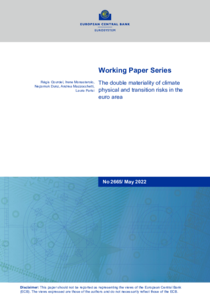The double materiality of climate physical and transition risks in the euro area

Gourdel, Régis ; Monasterolo, Irene ; Dunz, Nepomuk ; Mazzocchetti, Andrea ; Parisi, Laura
ECB - Frankfurt am Main
2022
62 p.
climate change ; financial aspect ; investment ; risk awareness ; financial policy ; decarbonization
Working Paper
2665
Financing and monetary policy
https://www.ecb.europa.eu/pub/pdf/scpwps/ecb.wp2665~622858d454.en.pdf
English
Bibliogr.
"The analysis of the conditions under which, and extent to which climate-adjusted financial risk assessment affects firms' investment decisions in the low-carbon transition, and the realisation of the climate mitigation trajectories, still represent a knowledge gap. Filling this gap is crucial to assess the “double materiality” of climate-related financial risks. By tailoring the EIRIN Stock-Flow Consistent model, we provide a dynamic balance sheets assessment of climate physical and transition risks for the euro area, using the climate scenarios of the Network for Greening the Financial System (NGFS). We find that an orderly transition achieves important co-benefits already in the mid-term, with respect to carbon emissions abatement, financial stability, and economic output. In contrast, a disorderly transition can harm financial stability, thus limiting firms' capacity to invest in low-carbon activities that could decrease their exposure to transition risk and help them recover from climate physical shocks. Importantly, investors' climate sentiments, i.e. their anticipation of the impact of the carbon tax across NGFS scenarios, play a key role for smoothing the transition in the economy and finance. Our results highlight the importance for financial supervisors to consider the role of firms and investors' expectations in the low-carbon tran"sition, in order to design appropriate macro-prudential policies for tackling climate risks.
Digital
The ETUI is co-funded by the European Union. Views and opinions expressed are however those of the author(s) only and do not necessarily reflect those of the European Union or the ETUI.